Deck 11: Ethers, Epoxides, and Sulfides
Question
Question
Question
Question
Question
Question
Question
Question
Question
Question
Question
Question
Question
Question
Question
Question
Question
Question
Question
Question
Question
Question
Question
Question
Question
Question
Question
Question
Question
Question
Question
Question
Question
Question
Question
Question
Question
Question
Question
Question
Question
Question
Question
Question
Question
Question
Question
Question
Question
Question
Question
Question
Question
Question
Question
Question
Question
Question
Question
Question
Question
Question
Question
Question
Question
Question
Question
Question
Question
Question
Question
Question
Question
Question
Question
Question
Question
Question
Question
Question

Unlock Deck
Sign up to unlock the cards in this deck!
Unlock Deck
Unlock Deck
1/93
Play
Full screen (f)
Deck 11: Ethers, Epoxides, and Sulfides
1
What is the major organic product obtained from the following reaction? 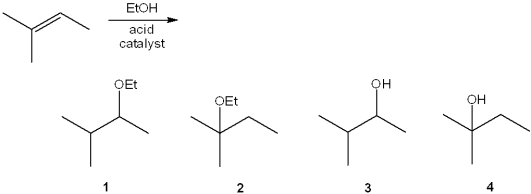
A)1
B)2
C)3
D)4

A)1
B)2
C)3
D)4
2
2
What is the correct assignment of the names of the following ethers? 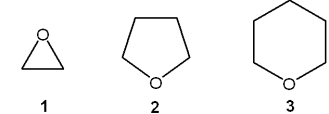
A)1 = oxirane; 2 = oxetane; 3 = oxane
B)1 = oxirane; 2 = oxitane; 3 = oxane
C)1 = oxane; 2 = dioxane; 3 = oxetane
D)1 = oxirane; 2 = oxolane; 3 = oxane

A)1 = oxirane; 2 = oxetane; 3 = oxane
B)1 = oxirane; 2 = oxitane; 3 = oxane
C)1 = oxane; 2 = dioxane; 3 = oxetane
D)1 = oxirane; 2 = oxolane; 3 = oxane
1 = oxirane; 2 = oxolane; 3 = oxane
3
What is the major organic product obtained from the following reaction? 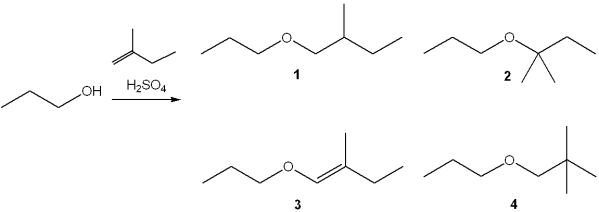
A)1
B)2
C)3
D)4

A)1
B)2
C)3
D)4
2
4
What is the major organic product obtained from the following reaction? 
A)1
B)2
C)3
D)4

A)1
B)2
C)3
D)4

Unlock Deck
Unlock for access to all 93 flashcards in this deck.
Unlock Deck
k this deck
5
What is the correct assignment of the names of the following ethers? 
A)1 = oxirane; 2 = oxetane; 3= oxolane
B)1 = oxetane; 2 = oxirane; 3= oxane
C)1 = oxane; 2 = oxetane; 3= dioxane
D)1 = oxirane; 2 = oxolane; 3= oxetane

A)1 = oxirane; 2 = oxetane; 3= oxolane
B)1 = oxetane; 2 = oxirane; 3= oxane
C)1 = oxane; 2 = oxetane; 3= dioxane
D)1 = oxirane; 2 = oxolane; 3= oxetane

Unlock Deck
Unlock for access to all 93 flashcards in this deck.
Unlock Deck
k this deck
6
Which of the following reactions provides tert-butyl methyl ether in a high yield?
A)potassium tert-butoxide + iodomethane
B)sodium methoxide + tert-butyl bromide
C)methanol + tert-butyl alcohol in the presence of KOH
D)iodomethane + tert-butyl bromide in the presence of KOH
A)potassium tert-butoxide + iodomethane
B)sodium methoxide + tert-butyl bromide
C)methanol + tert-butyl alcohol in the presence of KOH
D)iodomethane + tert-butyl bromide in the presence of KOH

Unlock Deck
Unlock for access to all 93 flashcards in this deck.
Unlock Deck
k this deck
7
Which of the following are epoxides? 
A)only 2 and 3
B)only 3 and 4
C)only 2, 3 and 4
D)1, 2, 3 and 4

A)only 2 and 3
B)only 3 and 4
C)only 2, 3 and 4
D)1, 2, 3 and 4

Unlock Deck
Unlock for access to all 93 flashcards in this deck.
Unlock Deck
k this deck
8
What is the major organic product obtained from the following reaction? 
A)1
B)2
C)3
D)4

A)1
B)2
C)3
D)4

Unlock Deck
Unlock for access to all 93 flashcards in this deck.
Unlock Deck
k this deck
9
What type of reactive intermediate is formed in the reaction of tert-butyl methyl ether with HBr to give tert-butyl bromide?
A)tert-butyl anion
B)tert-butoxide
C)tert-butyl radical
D)tert-butyl cation
A)tert-butyl anion
B)tert-butoxide
C)tert-butyl radical
D)tert-butyl cation

Unlock Deck
Unlock for access to all 93 flashcards in this deck.
Unlock Deck
k this deck
10
Which of the following reactions provides anisole (PhOCH3) in a high yield?
A)phenol + sodium methoxide
B)bromobenzene + bromomethane
C)sodium phenoxide (PhONa) + bromomethane
D)bromobenzene + sodium methoxide
A)phenol + sodium methoxide
B)bromobenzene + bromomethane
C)sodium phenoxide (PhONa) + bromomethane
D)bromobenzene + sodium methoxide

Unlock Deck
Unlock for access to all 93 flashcards in this deck.
Unlock Deck
k this deck
11
Which of the following statements are true?
1)ethanol is more soluble in water than dimethyl ether
2)ethanol has a higher boiling point than dimethyl ether
3)ethanol has the same molecular weight as dimethyl ether
A)only 1
B)only 1 and 2
C)only 1 and 3
D)1, 2 and 3
1)ethanol is more soluble in water than dimethyl ether
2)ethanol has a higher boiling point than dimethyl ether
3)ethanol has the same molecular weight as dimethyl ether
A)only 1
B)only 1 and 2
C)only 1 and 3
D)1, 2 and 3

Unlock Deck
Unlock for access to all 93 flashcards in this deck.
Unlock Deck
k this deck
12
Which of the following ethers cannot be prepared by a Williamson ether synthesis?
A)tert-butyl phenyl ether
B)isopropyl methyl ether
C)anisole
D)tert-butyl methyl ether
A)tert-butyl phenyl ether
B)isopropyl methyl ether
C)anisole
D)tert-butyl methyl ether

Unlock Deck
Unlock for access to all 93 flashcards in this deck.
Unlock Deck
k this deck
13
What is the IUPAC name of the following compound? 
A)cis-1,4-anisole
B)cis-4-methoxyanisole
C)cis-1,4-dimethoxycyclohexane
D)para-dianisole

A)cis-1,4-anisole
B)cis-4-methoxyanisole
C)cis-1,4-dimethoxycyclohexane
D)para-dianisole

Unlock Deck
Unlock for access to all 93 flashcards in this deck.
Unlock Deck
k this deck
14
What type of mechanism accounts for the cleavage of tert-butyl methyl ether upon treatment with HBr?
A)SN1
B)SN2
C)E1
D)E2
A)SN1
B)SN2
C)E1
D)E2

Unlock Deck
Unlock for access to all 93 flashcards in this deck.
Unlock Deck
k this deck
15
Which of the following are ethers? 
A)only 1 and 2
B)only 1 and 4
C)only 1, 2 and 3
D)1, 2, 3 and 4

A)only 1 and 2
B)only 1 and 4
C)only 1, 2 and 3
D)1, 2, 3 and 4

Unlock Deck
Unlock for access to all 93 flashcards in this deck.
Unlock Deck
k this deck
16
What is the major organic product obtained from the following reaction? 
A)1
B)2
C)3
D)4

A)1
B)2
C)3
D)4

Unlock Deck
Unlock for access to all 93 flashcards in this deck.
Unlock Deck
k this deck
17
What type of mechanism accounts for the cleavage of dibutyl ether upon treatment with HBr to give two moles of 1-bromobutane?
A)SN1
B)SN2
C)E1
D)E2
A)SN1
B)SN2
C)E1
D)E2

Unlock Deck
Unlock for access to all 93 flashcards in this deck.
Unlock Deck
k this deck
18
Which of the following are thiols? 
A)only 1
B)only 1 and 4
C)only 2 and 3
D)1, 2, 3 and 4

A)only 1
B)only 1 and 4
C)only 2 and 3
D)1, 2, 3 and 4

Unlock Deck
Unlock for access to all 93 flashcards in this deck.
Unlock Deck
k this deck
19
What is the major organic product obtained from the following reaction? 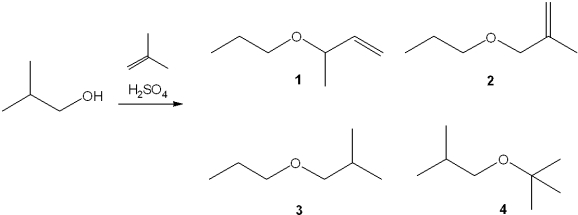
A)1
B)2
C)3
D)4

A)1
B)2
C)3
D)4

Unlock Deck
Unlock for access to all 93 flashcards in this deck.
Unlock Deck
k this deck
20
What is the IUPAC name of the following compound? 
A)ethyl isopropyl thiol
B)2-ethylsulfanylpropane
C)ethyl isopropyl disulfide
D)isopropylsufanylethane

A)ethyl isopropyl thiol
B)2-ethylsulfanylpropane
C)ethyl isopropyl disulfide
D)isopropylsufanylethane

Unlock Deck
Unlock for access to all 93 flashcards in this deck.
Unlock Deck
k this deck
21
What is the major organic product obtained from the following reaction? 
A)1
B)2
C)3
D)4

A)1
B)2
C)3
D)4

Unlock Deck
Unlock for access to all 93 flashcards in this deck.
Unlock Deck
k this deck
22
What is the major organic product obtained from the following reaction? 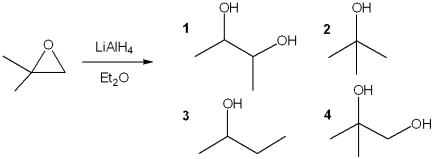
A)1
B)2
C)3
D)4

A)1
B)2
C)3
D)4

Unlock Deck
Unlock for access to all 93 flashcards in this deck.
Unlock Deck
k this deck
23
What is the major organic product obtained from the following reaction? 
A)1
B)2
C)3
D)4

A)1
B)2
C)3
D)4

Unlock Deck
Unlock for access to all 93 flashcards in this deck.
Unlock Deck
k this deck
24
What is the best choice of reagent(s) to perform the following transformation? 
A)O3
B)peroxyacid
C)OsO4; followed by NaHSO3
D)H2O, H2SO4

A)O3
B)peroxyacid
C)OsO4; followed by NaHSO3
D)H2O, H2SO4

Unlock Deck
Unlock for access to all 93 flashcards in this deck.
Unlock Deck
k this deck
25
What is the major organic product obtained from the following sequence of reactions? 
A)1
B)2
C)3
D)4

A)1
B)2
C)3
D)4

Unlock Deck
Unlock for access to all 93 flashcards in this deck.
Unlock Deck
k this deck
26
What is the major organic product obtained from the following sequence of reactions? 
A)1
B)2
C)3
D)4

A)1
B)2
C)3
D)4

Unlock Deck
Unlock for access to all 93 flashcards in this deck.
Unlock Deck
k this deck
27
What is the major organic product obtained from the following reaction? 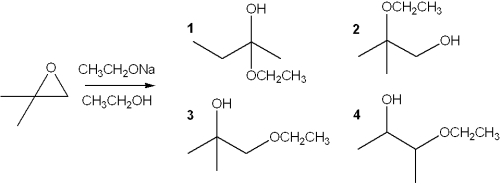
A)1
B)2
C)3
D)4

A)1
B)2
C)3
D)4

Unlock Deck
Unlock for access to all 93 flashcards in this deck.
Unlock Deck
k this deck
28
What is the major organic product obtained from the following sequence of reactions? 
A)1
B)2
C)3
D)4

A)1
B)2
C)3
D)4

Unlock Deck
Unlock for access to all 93 flashcards in this deck.
Unlock Deck
k this deck
29
What is the major organic product obtained from the following reaction? 
A)only 1
B)only 2
C)only 3
D)both 2 and 3

A)only 1
B)only 2
C)only 3
D)both 2 and 3

Unlock Deck
Unlock for access to all 93 flashcards in this deck.
Unlock Deck
k this deck
30
What is the major organic product obtained from the following sequence of reactions? 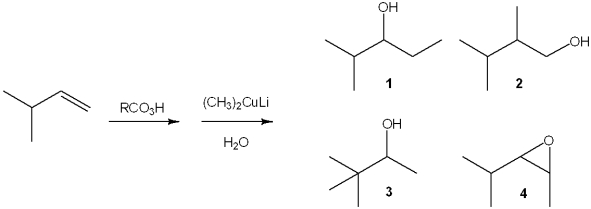
A)1
B)2
C)3
D)4

A)1
B)2
C)3
D)4

Unlock Deck
Unlock for access to all 93 flashcards in this deck.
Unlock Deck
k this deck
31
What type of reactive intermediate is formed in the reaction of methyl propene with methanol in the presence of an acid catalyst to give methyl tert-butyl ether (MTBE)?
A)tert-butyl cation
B)tert-butyl radical
C)tert-butyl anion
D)tert-butoxide
A)tert-butyl cation
B)tert-butyl radical
C)tert-butyl anion
D)tert-butoxide

Unlock Deck
Unlock for access to all 93 flashcards in this deck.
Unlock Deck
k this deck
32
What is the major organic product obtained from the following reaction? 
A)only 1
B)only 2
C)only 3
D)both 2 and 3

A)only 1
B)only 2
C)only 3
D)both 2 and 3

Unlock Deck
Unlock for access to all 93 flashcards in this deck.
Unlock Deck
k this deck
33
What is the best choice of reagent(s) to perform the following transformation? 
A)H2O
B)H2SO4, H2O
C)LiAlH4 followed by H3O+
D)KMnO4

A)H2O
B)H2SO4, H2O
C)LiAlH4 followed by H3O+
D)KMnO4

Unlock Deck
Unlock for access to all 93 flashcards in this deck.
Unlock Deck
k this deck
34
What is the major organic product obtained from the following reaction? 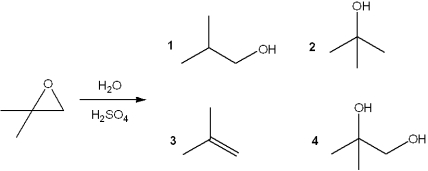
A)1
B)2
C)3
D)4

A)1
B)2
C)3
D)4

Unlock Deck
Unlock for access to all 93 flashcards in this deck.
Unlock Deck
k this deck
35
What is the major organic product obtained from the following reaction? 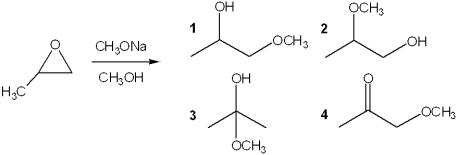
A)1
B)2
C)3
D)4

A)1
B)2
C)3
D)4

Unlock Deck
Unlock for access to all 93 flashcards in this deck.
Unlock Deck
k this deck
36
What is the major organic product obtained from the following sequence of reactions? 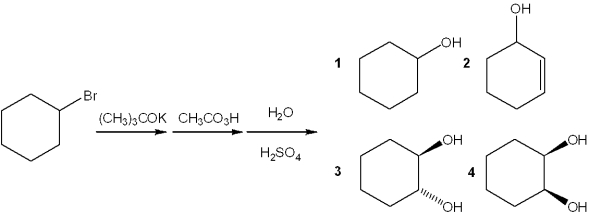
A)1
B)2
C)3
D)4

A)1
B)2
C)3
D)4

Unlock Deck
Unlock for access to all 93 flashcards in this deck.
Unlock Deck
k this deck
37
What is the best choice of reagent(s) to perform the following transformation? 
A)peroxyacid
B)Br2, H2O; followed by NaOH, H2O
C)OsO4; followed by NaHSO3
D)H2O, H2SO4

A)peroxyacid
B)Br2, H2O; followed by NaOH, H2O
C)OsO4; followed by NaHSO3
D)H2O, H2SO4

Unlock Deck
Unlock for access to all 93 flashcards in this deck.
Unlock Deck
k this deck
38
What are the major products obtained upon treatment of tert-butyl methyl ether with excess HBr?
A)tert-butyl alcohol and methanol
B)tert-butyl bromide and methanol
C)tert-butyl alcohol and bromomethane
D)tert-butyl bromide and bromomethane
A)tert-butyl alcohol and methanol
B)tert-butyl bromide and methanol
C)tert-butyl alcohol and bromomethane
D)tert-butyl bromide and bromomethane

Unlock Deck
Unlock for access to all 93 flashcards in this deck.
Unlock Deck
k this deck
39
What is the best choice of reagent(s) to perform the following transformation? 
A)CH3MgBr; followed by H3O+
B)H2O, NaOH
C)LiAlH4 followed by H3O+
D)KMnO4

A)CH3MgBr; followed by H3O+
B)H2O, NaOH
C)LiAlH4 followed by H3O+
D)KMnO4

Unlock Deck
Unlock for access to all 93 flashcards in this deck.
Unlock Deck
k this deck
40
What are the major products obtained upon treatment of anisole, PhOCH3, with excess HBr?
A)phenol and methanol
B)bromobenzene and bromomethane
C)phenol and bromomethane
D)bromobenzene and methanol
A)phenol and methanol
B)bromobenzene and bromomethane
C)phenol and bromomethane
D)bromobenzene and methanol

Unlock Deck
Unlock for access to all 93 flashcards in this deck.
Unlock Deck
k this deck
41
Which of the following ions forms the strongest complex with 18-crown-6?
A)Li+
B)Na+
C)K+
D)Rb+
A)Li+
B)Na+
C)K+
D)Rb+

Unlock Deck
Unlock for access to all 93 flashcards in this deck.
Unlock Deck
k this deck
42
What would be the best choice of reagent(s) to perform the following transformation? 
A)CH3OH, H2SO4
B)NaOEt, followed by CH3OH
C)NaOEt, followed by CH3I
D)CH3OCH3

A)CH3OH, H2SO4
B)NaOEt, followed by CH3OH
C)NaOEt, followed by CH3I
D)CH3OCH3

Unlock Deck
Unlock for access to all 93 flashcards in this deck.
Unlock Deck
k this deck
43
What is the major organic product obtained from the following reaction? 
A)1
B)2
C)3
D)4

A)1
B)2
C)3
D)4

Unlock Deck
Unlock for access to all 93 flashcards in this deck.
Unlock Deck
k this deck
44
What is the major organic product obtained from the following reaction? 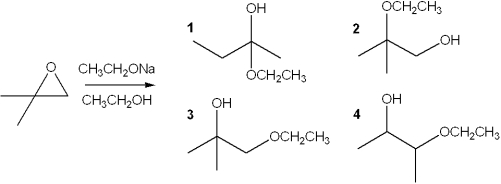
A)1
B)2
C)3
D)4

A)1
B)2
C)3
D)4

Unlock Deck
Unlock for access to all 93 flashcards in this deck.
Unlock Deck
k this deck
45
What is the major organic product obtained from the following sequence of reactions? 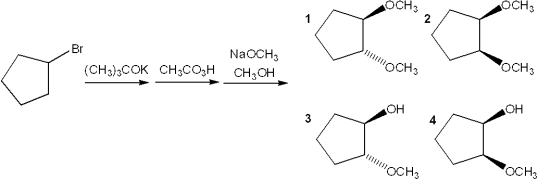
A)1
B)2
C)3
D)4

A)1
B)2
C)3
D)4

Unlock Deck
Unlock for access to all 93 flashcards in this deck.
Unlock Deck
k this deck
46
Which of the following general structures can be made by sequential reaction of epichlorohydrin with appropriate nucleophiles? 
A)1
B)2
C)3
D)4

A)1
B)2
C)3
D)4

Unlock Deck
Unlock for access to all 93 flashcards in this deck.
Unlock Deck
k this deck
47
What is the name of the following compound? 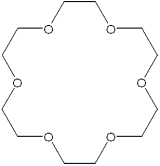
A)6-crown-12
B)12-crown-6
C)18-crown-12
D)18-crown-6

A)6-crown-12
B)12-crown-6
C)18-crown-12
D)18-crown-6

Unlock Deck
Unlock for access to all 93 flashcards in this deck.
Unlock Deck
k this deck
48
What is the major organic product obtained from the following reaction? 
A)1
B)2
C)3
D)4

A)1
B)2
C)3
D)4

Unlock Deck
Unlock for access to all 93 flashcards in this deck.
Unlock Deck
k this deck
49
The correct structure for dibenzyl ether is shown below. 


Unlock Deck
Unlock for access to all 93 flashcards in this deck.
Unlock Deck
k this deck
50
What is the major organic product obtained from the following reaction? 
A)1
B)2
C)3
D)4

A)1
B)2
C)3
D)4

Unlock Deck
Unlock for access to all 93 flashcards in this deck.
Unlock Deck
k this deck
51
What is the major organic product obtained from the following sequence of reactions? 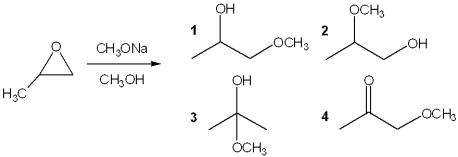
A)1
B)2
C)3
D)4

A)1
B)2
C)3
D)4

Unlock Deck
Unlock for access to all 93 flashcards in this deck.
Unlock Deck
k this deck
52
Which of the following statements is not true?
A)Crown ethers complex alkali metal ions by donation of lone pairs from the oxygen atoms to the metal cation.
B)Metal ion complexes of crown ethers dissolve in nonpolar aprotic organic solvents
C)Addition of 18-crown-6 to a solution of benzyl bromide and potassium cyanide in a nonpolar solvent increases the rate of nucleophilic substitution.
D)18-Crown-6 is a planar molecule
A)Crown ethers complex alkali metal ions by donation of lone pairs from the oxygen atoms to the metal cation.
B)Metal ion complexes of crown ethers dissolve in nonpolar aprotic organic solvents
C)Addition of 18-crown-6 to a solution of benzyl bromide and potassium cyanide in a nonpolar solvent increases the rate of nucleophilic substitution.
D)18-Crown-6 is a planar molecule

Unlock Deck
Unlock for access to all 93 flashcards in this deck.
Unlock Deck
k this deck
53
Which of the following synthetic routes is used in industry to provide epichlorohydrin? 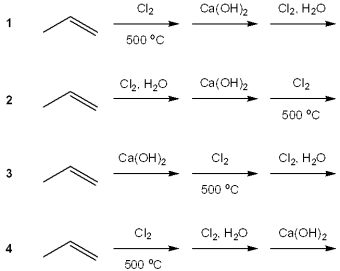
A)1
B)2
C)3
D)4

A)1
B)2
C)3
D)4

Unlock Deck
Unlock for access to all 93 flashcards in this deck.
Unlock Deck
k this deck
54
What would be the best choice of reagent(s) to perform the following transformation? 
A)CH3-Na+
B)CH3SH, H2SO4
C)CH3OH, Na2S
D)CH3I, H2SO4

A)CH3-Na+
B)CH3SH, H2SO4
C)CH3OH, Na2S
D)CH3I, H2SO4

Unlock Deck
Unlock for access to all 93 flashcards in this deck.
Unlock Deck
k this deck
55
What is the major organic product obtained from the following reaction? 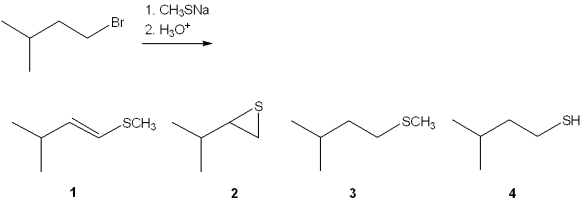
A)1
B)2
C)3
D)4

A)1
B)2
C)3
D)4

Unlock Deck
Unlock for access to all 93 flashcards in this deck.
Unlock Deck
k this deck
56
What is the major organic product obtained from the following reaction? 
A)1
B)2
C)3
D)4

A)1
B)2
C)3
D)4

Unlock Deck
Unlock for access to all 93 flashcards in this deck.
Unlock Deck
k this deck
57
What would be the best choice of reagent(s) to perform the following transformation? 
A)H2O2
B)NaIO4
C)H2O, NaOH
D)H2SO4

A)H2O2
B)NaIO4
C)H2O, NaOH
D)H2SO4

Unlock Deck
Unlock for access to all 93 flashcards in this deck.
Unlock Deck
k this deck
58
What is the major organic product obtained from the following sequence of reactions? 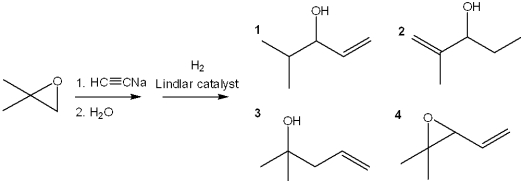
A)1
B)2
C)3
D)4

A)1
B)2
C)3
D)4

Unlock Deck
Unlock for access to all 93 flashcards in this deck.
Unlock Deck
k this deck
59
What would be the best choice of reagent(s) to perform the following transformation? 
A)H3O+
B)H2O, NaOH
C)LiAlH4 followed by H3O+
D)H2O2

A)H3O+
B)H2O, NaOH
C)LiAlH4 followed by H3O+
D)H2O2

Unlock Deck
Unlock for access to all 93 flashcards in this deck.
Unlock Deck
k this deck
60
The structure shown below can be named as either ethylene oxide or oxirane. 


Unlock Deck
Unlock for access to all 93 flashcards in this deck.
Unlock Deck
k this deck
61
The following reaction would result in the formation of a ____________group. 


Unlock Deck
Unlock for access to all 93 flashcards in this deck.
Unlock Deck
k this deck
62
The first step in the mechanism of acid catalyzed ring opening of oxirane is protonation of the oxygen in the oxirane.

Unlock Deck
Unlock for access to all 93 flashcards in this deck.
Unlock Deck
k this deck
63
Consider the cleavage of the following ether with H2O and H+.  Cleavage of the following ether will be a slower process.
Cleavage of the following ether will be a slower process. 
 Cleavage of the following ether will be a slower process.
Cleavage of the following ether will be a slower process. 

Unlock Deck
Unlock for access to all 93 flashcards in this deck.
Unlock Deck
k this deck
64
The correct name for the following compound is 12-crown-4. 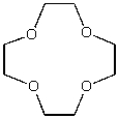


Unlock Deck
Unlock for access to all 93 flashcards in this deck.
Unlock Deck
k this deck
65
The correct name for the following compound is cyclopropyl ethyl thiol. 


Unlock Deck
Unlock for access to all 93 flashcards in this deck.
Unlock Deck
k this deck
66
The following reaction is a valid means of preparing the given product. 


Unlock Deck
Unlock for access to all 93 flashcards in this deck.
Unlock Deck
k this deck
67
Consider the following reaction.  The name of the aromatic product is __________________.
The name of the aromatic product is __________________.
 The name of the aromatic product is __________________.
The name of the aromatic product is __________________.
Unlock Deck
Unlock for access to all 93 flashcards in this deck.
Unlock Deck
k this deck
68
Consider the following reaction.  The major organic product obtained from the reaction is
The major organic product obtained from the reaction is 
 The major organic product obtained from the reaction is
The major organic product obtained from the reaction is 

Unlock Deck
Unlock for access to all 93 flashcards in this deck.
Unlock Deck
k this deck
69
The following reaction would be best accomplished by the addition of _______________. (Assume that CH3CO2H is also produced.) 


Unlock Deck
Unlock for access to all 93 flashcards in this deck.
Unlock Deck
k this deck
70
The correct name for the following substance is cis-1,2-dimethyloxirane. 


Unlock Deck
Unlock for access to all 93 flashcards in this deck.
Unlock Deck
k this deck
71
A protecting group changes the reactivity of a functional group to one that is inert to reaction conditions without becoming a permanent part of the molecule.

Unlock Deck
Unlock for access to all 93 flashcards in this deck.
Unlock Deck
k this deck
72
Consider the reaction below to answer the following questions. 
The reaction shown here is an example of a ______________ ________synthesis

The reaction shown here is an example of a ______________ ________synthesis

Unlock Deck
Unlock for access to all 93 flashcards in this deck.
Unlock Deck
k this deck
73
The name of the alkene that reacts with methanol in an acid catalyzed reaction to produce t-butyl methyl ether is ________________.

Unlock Deck
Unlock for access to all 93 flashcards in this deck.
Unlock Deck
k this deck
74
Adding Br2 in H2O will distinguish between ethyl phenyl ether and allyl phenyl ether.

Unlock Deck
Unlock for access to all 93 flashcards in this deck.
Unlock Deck
k this deck
75
Consider the reaction below to answer the following questions. 
The reaction shown here proceeds by a(n) _______ mechanism.

The reaction shown here proceeds by a(n) _______ mechanism.

Unlock Deck
Unlock for access to all 93 flashcards in this deck.
Unlock Deck
k this deck
76
Consider the reaction below to answer the following questions. 
The name of the product of the reaction is _______________________.

The name of the product of the reaction is _______________________.

Unlock Deck
Unlock for access to all 93 flashcards in this deck.
Unlock Deck
k this deck
77
When cyclopentene is treated with peroxyacetic acid, the product that forms is _________________.

Unlock Deck
Unlock for access to all 93 flashcards in this deck.
Unlock Deck
k this deck
78
A crown ether named 18-crown-6 has a total of carbons and oxygens .

Unlock Deck
Unlock for access to all 93 flashcards in this deck.
Unlock Deck
k this deck
79
The first step in the following conversion should be the addition of (CH3)3SiCl, (CH3CH2)3N. 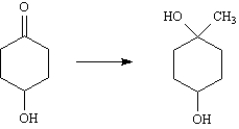


Unlock Deck
Unlock for access to all 93 flashcards in this deck.
Unlock Deck
k this deck
80
The synthesis of dipropyl ether can be accomplished by reacting 1-propanol with H2SO4 at 140°C.

Unlock Deck
Unlock for access to all 93 flashcards in this deck.
Unlock Deck
k this deck


